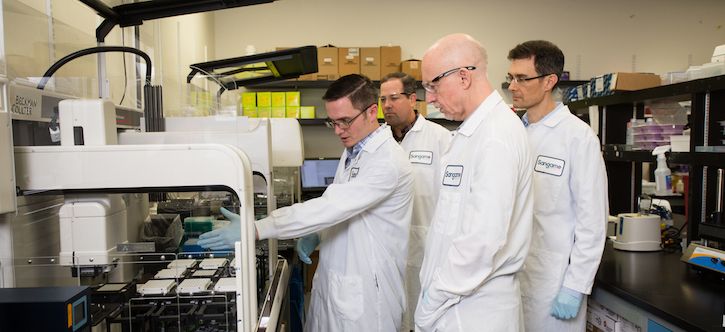Sangamo Gets Green Light for UK Clinical Trials
The burgeoning gen-editing giant will test its zinc finger nuclease (ZFN) editing technology against lysosomal storage disorders in children.

Sangamo executives in the company's California lab.
Sangamo, a company that specializes in zinc finger nuclease (ZFN) editing technology, just received the go-ahead to test its methods for a clinical trial in the United Kingdom.
The country’s Medicines and Healthcare Products Regulatory Agency (MHRA) is authorizing the company to recruit patients for Phase 1 and 2 clinical trials evaluating ZFN-based intervention efficacy for the treatment of Mucopolysaccharidosis Type I (MPS I) and MPS II. MPS is a class of genetic disorders that prevent patients’ bodies from correctly breaking down unwanted substances in cells, which can result in cell damage and serious health consequences.
>>>READ: Sangamo Receives $8 Million Grant from California's Stem Cell Research Fund
ZFN is a form of gene editing that targets the structures—zinc fingers—that regulate gene expression. By manipulating them, it is thought that certain genetic disorders can be corrected.
The approved in vivo trials will involve Sangamo’s developmental SB-318 and SB-913 treatments. The UK has authorized the firm to conduct the trials in children as young as 5 years old, based on safety data from adult and adolescent cohorts. Sangamo also said it plans to request an amendment to allow recruitment of even younger patients in the SB-318 trial.
The company is building a diverse pipeline to apply ZFN to a host of conditions. It recently received a substantial grant from the California Institute for Regenerative Medicine to continue work on an intervention for the hemoglobin disorder beta thalassemia. That candidate, ST-400, is a collaboration with Bioverativ and the FDA has already accepted a New Drug Application for it.
Other conditions in Sangamo’s crosshairs include HIV, Sickle Cell Disease (also alongside Bioverativ), Hemophilia A (with Pfizer), and Huntington’s Disease (developed with Shire). Earlier this year, the company also inked a $3 billion deal with Gilead subsidiary Kite to work on oncology therapeutics.
The day before that news was announced, Healthcare Analytics News™ published an extensive profile of Sangamo’s history and technology. If the massive contracts and numerous collaborations are any indication, pharma has high hopes for the California-based company and its ZFN innovations. The key going forward will be to show that it can work.
“It’s all about delivery,” company president and CEO Sandy Macrae, PhD, said in an interview. “Delivery will open up new diseases. That will be the future of the company.”
Related Coverage:
Podcast: The Gene-Editing Company That Didn't Need CRISPR
Lost in the CRISPR Hype, a Gene-Editing Giant Is Fighting Back